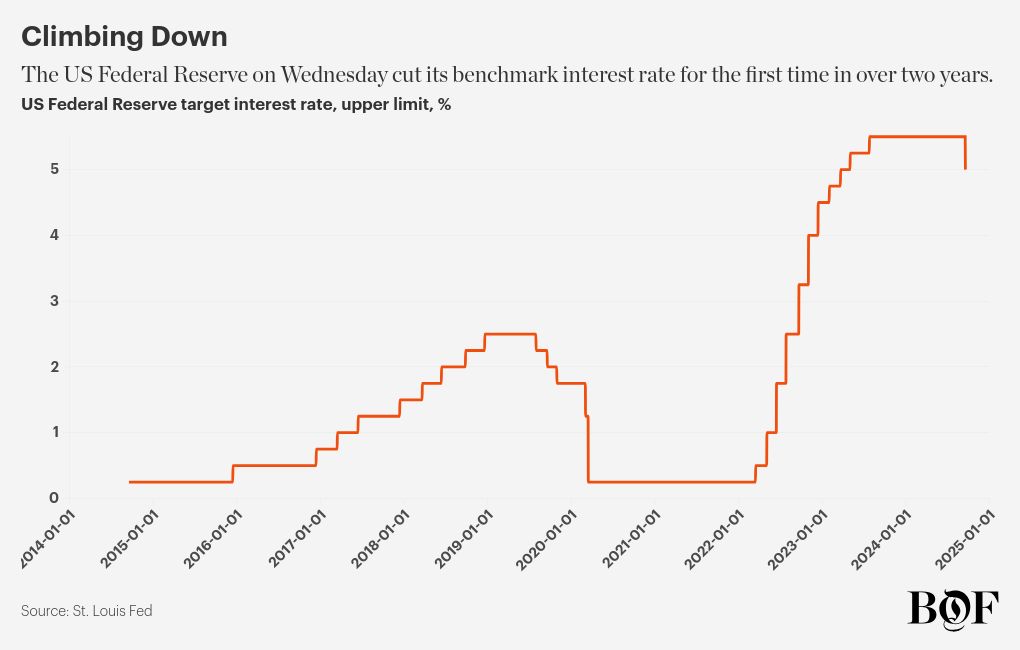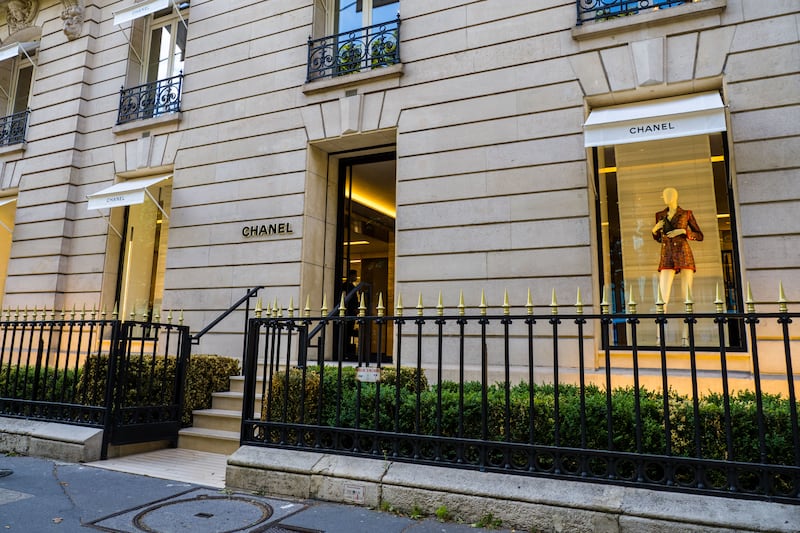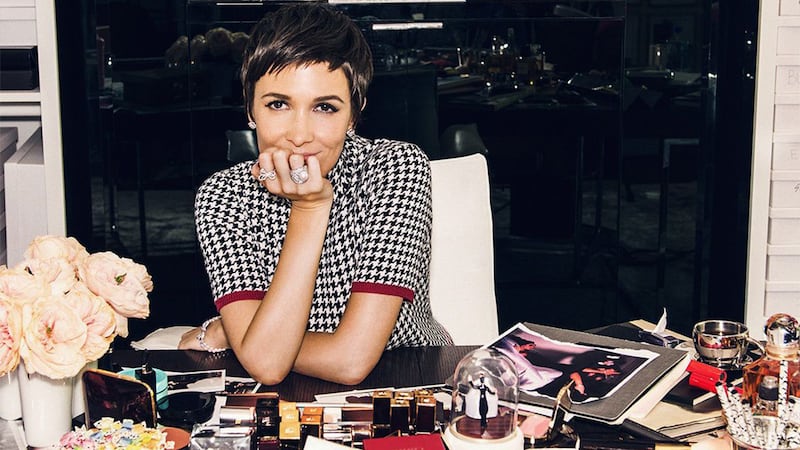
Money just got a little less expensive.
On Wednesday, the US Federal Reserve made its first interest rate cut in four years, effectively declaring victory in its effort to bring down inflation that set in after the pandemic. Officials voted to lower the rate, used as a benchmark to set borrowing costs throughout the economy, by half a percentage point, to a range of 4.75 percent to 5 percent. That’s higher than the quarter point many economists expected.
The hope is that by lowering rates, the Fed will officially usher in a so-called soft landing for the US economy, where inflation is brought down to target levels without triggering a recession. In August, consumer prices rose at their slowest pace since February 2021. But hiring has slowed dramatically, raising recession fears and contributing to the decision for a more aggressive cut.
The Fed’s move is part of a global trend: the European Central Bank and Bank of Canada cut rates earlier this month, while the United Kingdom and Mexico did the same in August.
The decrease will have a widespread impact, with effects on the stock market, hiring and loans, including mortgages. Broadly, lowering borrowing costs is a way to heat up the economy and stimulate demand. The effects on fashion will be nuanced. BoF explains what rate cuts mean for consumers, brands, retailers and investors.
Will consumers spend more?
For years, consumers watched interest payments on their credit card balances tick up with each Fed rate hike. This week’s cut, which is expected to be the first of several in the coming months, will lower those payments along with other forms of debt, including new mortgages. Retailers are hoping this will free up more money for consumers to make discretionary purchases, particularly among lower and middle income shoppers, said Sucharita Kodali, vice president at research firm Forrester.
The author has shared a Flourish data chart.You will need to accept and consent to the use of cookies and similar technologies by our third-party partners (including: YouTube, Instagram or Twitter), in order to view embedded content in this article and others you may visit in future.
For the most part, consumers have continued to shop even as economic data increasingly pointed to trouble ahead: US retail sales beat expectations again in August. Still, we’re far from the boom times of 2022. A number of mass-market retailers, including Macy’s, Urban Outfitters, Lululemon and Ulta Beauty in recent weeks said they are seeing slowdowns in spending. The luxury sector has also been hit hard. Plus, shoppers are sitting on record credit card debt, according to the Federal Reserve Bank of New York.
For fashion, it’s the mood that rate cuts put shoppers in that matters most: good news helps increase consumers’ confidence, and with it, presumably their cart size too.
“It doesn’t make a big impact on someone’s wallet. It ends up being about the actual confidence itself,” said Kelly Pedersen, head of retail at PwC.
What does it mean for fashion companies?
Much like their customers, many fashion brands and retailers have borrowed heavily and will welcome the chance to refinance their debt at lower interest rates. Among the large fashion companies analysts point to as carrying relatively higher levels of debt are Macy’s and Nordstrom, as well as Capri and VF Corp. The latter recently sold Supreme and is exploring the sale of other brands in part to reduce its debt load.
As borrowing costs decrease, brands and retailers can redirect more money toward growth — opening stores, hiring more employees, crafting buzzy marketing pushes or investing in new digital strategies. Already, the retailers Pedersen works with are talking about how to revamp their stores to encourage sales, either with more salespeople or technology upgrades, he said.
Not all businesses will feel the cuts equally, though, said Simeon Siegel, BMO Capital Markets managing director and analyst.
“Rate cuts will impact borrowers very differently than they impact savers. Companies that have a lot of cash have benefitted from higher interest rates on their bank accounts, people who have been borrowing have not,” said Siegel.
At the same time as borrowing costs decrease, so too do the perks of storing cash. Many companies, including the more savings-forward Gap Inc. and Ralph Lauren, quietly benefitted from the increase in interest income, said Siegel.
“You lose the ability to simply generate cash in your sleep because your bank account works in your favour. You have to find other opportunities,” said Siegel.
How will investors react?
Fashion start-ups and established brands looking for buyers may start to see more interest. When rates are high, investors tend to park more of their money in cash and cash-like investments, such as treasury bills and money-market funds. Each rate cut will reduce the returns on those holdings, and encourage investors to seek out riskier investments – consumer brands among them.
There’s evidence that has already begun: almost half of investment firms servicing the ultra-wealthy have put more money towards private equity and listed companies this year versus last, Citigroup found in a survey of family offices released on Sept. 18.
Last week’s investment in minimal fashion label The Row — led by Chanel’s Wertheimers and L’Oréal’s Bettencourt-Meyers families, Imaginary Ventures and Moda Operandi co-founder Lauren Santo Domingo — was a potential harbinger of positive sentiment in the space.
Lower interest rates could heat the M&A market up too, analysts say.
“We start to see more deals as the cost of money decreases,” said Pedersen. “I wouldn’t be surprised if there’s more consolidation because there’s just more opportunity for cheap money to go and infuse in these investments.”
Of course, nothing will change overnight. Investors still may be wary of fashion investments. And rates are still relatively high. Much depends on whether the cuts continue, if they do, by how much. The next Fed meeting is Nov. 7, right after Election Day.
“It’s going to take a while. A lot of investors are hoping for a zero interest rate environment and we’re far from that,” said Kodali.
THE NEWS IN BRIEF
FASHION, BUSINESS AND THE ECONOMY

Chanel buys 42 Avenue Montaigne amid real estate arms race. The firm plans a major renovation for the 42 Avenue Montaigne boutique beginning in 2029. Chanel’s current property portfolio’s value is more than $7 billion, with a significant portion having been bought over the last 10 years.
Fed cuts rates by half point in a decisive bid to defend the economy. The Federal Reserve is aiming to bolster the labour market while signalling a cautious approach to future adjustments amid mixed economic indicators. Policymakers pencilled in an additional percentage point of cuts in 2025, according to their median forecast.
Zegna CEO is still betting on China despite uncertain growth. The Italian fashion house remains committed to its medium-term expansion strategy in China, prioritising marketing and made-to-measure services. The company reported first-half sales of €960 million ($1.1 billion), 6 percent higher than last year.
EssilorLuxottica extends smart glasses partnership with Meta. The new long-term agreement will take both companies into the next decade. The launch of the first smart glasses struggled to gain traction among consumers, the latest version, introduced in late 2023, has sold more units in a few months than the previous ones did in two years.
US retailer holiday hiring is set to be lower than last year. Retailers will hire fewer seasonal workers this holiday season than last year due to a softer labour market and tighter consumer spending heading into the crucial shopping period. Retailers are expected to add 520,000 new jobs in the final quarter of 2024 compared to 564,200 in 2023.
Hong Kong K11 Musea mall expands luxury offerings. Luxury brands owned by LVMH and Kering are among those expanding or upgrading their presence at the mall as owner New World Development bets on a rebound in the premium retail sector. The K11 brand malls have been a key growth driver for New World’s investment property sector.
Next ups profit guidance on international growth. The fashion and homeware retailer forecast its annual profits at £15 million more than previously expected, at £995 million — up from the £918 million recorded in 2023. Overseas sales rose by 23 percent in the six months to July, offsetting a near 1 percent decline in sales of Next-branded clothing in the UK.
UK warns 17 fashion brands on greenwashing. The Competition and Markets Authority has written to 17 “well-known” fashion brands advising them to review how they market sustainability claims. The letters highlight areas of concern, focused on vague or general claims that could mislead consumers.
THE BUSINESS OF BEAUTY

Cassandra Grey buys back Violet Grey. The cult beauty retailer’s founder teamed up with investor Sherif Guirgis to acquire the business back from Coupang, the South Korean owner of Farfetch. The retailer is also launching a brand development arm called Violet Lab, which Grey will lead as chairman and artistic director.
Ozempic “very likely” to face drug prices negotiations, Novo says. The ability to negotiate drug prices is part of a sweeping set of policies set forth in President Joe Biden’s Inflation Reduction Act. The law allows the US government to mandate lower drug prices, as many other nations around the world already do.
PEOPLE
British Fashion Council CEO to step down. Caroline Rush will step down from her position from June 2025, ending a 16-year run. The search for her successor will begin immediately, led by management consultancy Egon Zehnder. In the meantime, Rush will continue to lead the organisation.
i-D magazine appoints Thom Bettridge editor-in-chief. The magazine is set to resume publication with Bettridge as top editor and chief brand officer. Bettridge most recently served as Ssense’s vice president of creative content and he previously held editorial roles at 032c, Interview and Highsnobiety, where he was editor-in-chief.
Dazed Media names new executive director. Dan Fitzgerald will lead the company’s commercial partnerships across its digital and print publications including AnOther magazine, Another Man, Dazed and Dazed Beauty. He will also be responsible for the business’ Dazed app, a creative professional networking platform.
BBC report: former Harrods Boss Al Fayed raped and abused women. Mohamed Al Fayed’s victims and former employees described a pervasive climate of fear at Harrods, and said his predations were known among the staff. Rather than intervene, Harrods helped cover up abuse allegations, according to the BBC.
Compiled by Yola Mzizi.



